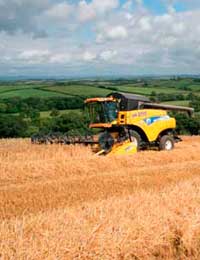HGCA Recommended List analysis: Barley varieties have established favourites to beat

Winter barley
Three new winter barleys make an appearance on the HGCA Recommended List this year, each aimed at a different market segment but all with established choices to beat.
Element is a hybrid six-row, Escadre is a conventional six-row and Florentine is a two-row feed variety.
Frontier’s David Waite isn’t convinced that Element will be preferred to Volume. “Volume is a very good variety which does the business for growers and Element doesn’t offer any advantages. I don’t know if it’s needed.”
However, he can see a place for Escadre. “It does offer a 4% yield advantage over Sequel and it has the specific weight of a two-row. Not everyone wants to grow hybrids.”
Florentine has the disease resistance lacking in some of the two-rows, he adds. “And it’s stiffer strawed. So it’s a solid variety which could be preferred to Retriever in the north.”
Clare Leaman of NIAB agrees that Florentine has some useful characteristics, but doesn’t anticipate that growers will be persuaded away from KWS Cassia in big numbers unless rhynchosporium is a particular concern.
She does, however, see that Escadre will tempt Sequel growers to move on. “Specific weight is the key and Escadre can achieve that.”
Spring barley
Talking about new spring barleys, when the market is only just starting to look at last year’s addition Propino, is not very easy, agree our commentators.
With four new recommendations – three of which are potential brewing/distilling types – there’s not much to confirm at this stage of their development.
Barry Barker of Masstock picks out Shuffle as being of interest in Scotland, where it has a 3% yield advantage over Concerto and offers malt distilling and brewing potential. “It’s a non GN type, which is important now.”
Moonshine, which goes into the testing system alongside Shuffle, is earlier and could suit Scottish growers better if it meets the market requirements. But it has a four for rhynchosporium, he warns.
Panther, with a recommendation for the east, also has a rhynchosporium rating of four. It will be tested for its brewing potential.
The feed variety, Summit, has a yield of 107. But it’s short, which worries most of the experts. “Appeal will be limited because of a lack of straw,” says Oppenfield’s Lee Bennett.
David Waite of Frontier points out that it has better rhynchosporium resistance than Waggon, which is the current favourite with farmers. “But will that be enough?”
CROPS BARLEY RATING* Element ** Escadre *** Florentine *** Shuffle *** Moonshine ** Panther * Summit * * Crops guide to likely grower appeal |
|---|
Scotland A mixed bag, with no obvious instant hits, says Steve Hoad of SAC, when asked about the suitability of the new varieties for Scotland. He picks out Shuffle from the spring barleys as having a yield advantage, a potential fit for brewing and distilling, and good agronomics. “It’s got the yield and quality combination. Could it be another Optic?” Shuffle is also very strong against brackling, an important consideration in the north, he notes. Moonshine has very good quality and the higher enzyme level required for grain distilling. “But its yield is moderate and it’s got weaker straw. It will all depend on how it performs in tests.” Neither Panther nor Summit is right for Scotland, he believes. “We’ve already got enough choice in these sectors.” The winter barleys are relevant for the north, says Dr Hoad, with hybrid Element likely to become a stablemate for Volume and Escadre replacing Sequel. “Florentine has a similar yield to KWS Cassia up here, but it does have the stiff straw and specific weight that growers want.” Of the winter wheats, he picks out Group 3 Tuxedo as of interest for its distilling potential. “A medium rating is fine and it has a good Hagberg. We’ll watch it carefully as it might replace Robigus.” The soft Group 4s, Denman and Gravitas, are both a bit weak strawed, he notes, so PGR use will be important. “Denman is suitable for distilling and is a bit earlier than Gravitas, but they don’t take yields on. They’re another set of options, rather than obvious choices. Alchemy, Viscount and Beluga are strong up here.” Group 4 Stigg is attracting some attention as a specialist variety, but KWS Santiago has too many problems for Scotland, he warns. |
|---|

